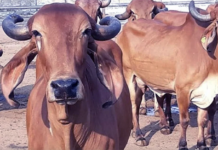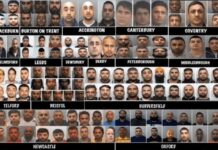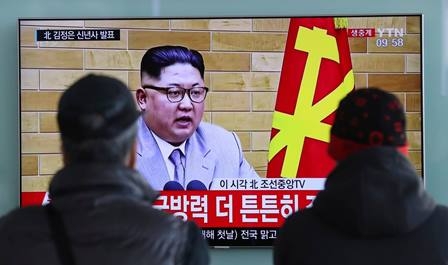
Christmas is banned inside the secretive country, so many believers this year held their celebrations underground
By Dan Wooding, Founder of ASSIST News Service
BEIJING, CHINA/PYONGYANG, NORTH KOREA (ANS – January 1, 2018) — North Korean leader Kim Jong Un boasted in an annual New Year’s Day speech today (Monday, January 1, 2018) that he had a nuclear button on his desk and that the entire United States was within range of his weapons — but he also vowed not to attack unless threatened.
According to Simon Denyer, the Washington Post (https://www.washingtonpost.com/) China Bureau Chief, Kim promised to focus this year on producing nuclear warheads and missiles for operational deployment. But he also struck a conciliatory note, opening the door to dialogue with South Korea and saying he would consider sending a delegation to the Winter Olympics to be held in his southern neighbor in February.
“The United States can never fight a war against me and our state,” he said in the nationally televised speech. “It should properly know that the whole territory of the U.S. is within the range of our nuclear strike and a nuclear button is always on the desk of my office, and this is just a reality, not a threat.”
But Kim, stated Denyer, also said that North Korea was a peace-loving and responsible nuclear power, and would not use its nuclear weapons unless “hostile aggression forces” encroach on its sovereignty or interests.
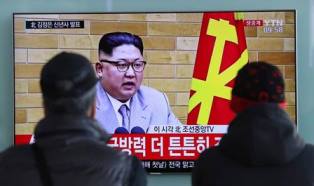 “This year, we should focus on mass-producing nuclear warheads and ballistic missiles for operational deployment,” Kim said. “These weapons will be used only if our security is threatened.”
“This year, we should focus on mass-producing nuclear warheads and ballistic missiles for operational deployment,” Kim said. “These weapons will be used only if our security is threatened.”
North Korea conducted its sixth and most powerful nuclear test in September and launched its most high-tech intercontinental ballistic missile in November, ignoring international condemnation and steadily tightening sanctions.
In typically bellicose language, he went on to say, it declared the latest round of United Nations sanctions imposed last month an “act of war,” and Kim said his country had achieved the historic feat of “completing” its nuclear forces.
“North Korea’s nuclear capabilities do not yet match Kim’s boasts, experts say, since it is far from clear it could successfully deliver a nuclear weapon on one of its missiles. Yet there is little doubt its capabilities have advanced significantly in the past year,” said Denyer.
“But Kim, dressed in a Western-style gray suit and tie, also offered a potential olive branch to Seoul, saying it is imperative to lower military tensions on the Korean Peninsula and improve ties with the South.”
He said that the path to dialogue was open and that he would consider sending a delegation to the Winter Olympics in Pyeongchang, South Korea.
“North Korea’s participation in the Winter Games will be a good opportunity to show unity of the people, and we wish the Games will be a success,” he said. “Officials from the two Koreas may urgently meet to discuss the possibility.”
South Korea has been trying to reassure the rest of the world that the Olympics will be safe despite the nuclear tensions, and President Moon Jae-in has said North Korea’s participation would ensure their safety. He also proposed last month that Seoul and Washington postpone annual joint military drills until after the Olympics, and he generally takes a less-confrontational approach to relations with the North than his predecessor, Park Geun-hye.
John Delury, a professor of international relations at Yonsei University in Seoul, said Kim’s message to Seoul was “more promising” than he had anticipated, addressing in a specific and actionable way South Korea’s desire to make the Games a success.
“That should give hope to those in the South who are trying to get something going and open a channel at least,” he said.
The idea of improving relations between the two Koreas is one that is frequently spoken about but seldom achieved, and Kim’s warmer words could also be seen as an attempt to drive a wedge between Seoul and Washington.
While Kim’s words were more combative toward the United States, he also refrained from a personal attack on President Trump, after the two men engaged in several rounds of mutual name-calling in 2017, Delury noted.
When asked about North Korea’s nuclear claims Sunday night, Trump said only, “We’ll see, we’ll see.”
“The upcoming Olympics provide an important opportunity to break the ice and to begin discussions with the North Koreans on mutual steps that reduce the chances of miscalculation and war,” he added.
Another tough Christmas for North Korea’s Underground Christians
Meanwhile, it has been another difficult Christmas for North Korea’s underground Christians, who have had to keep their activities very quiet in case they are discovered and sent to one of the countries labor camps, or worse. North Korea has, for the 14th successive year, been named by Open Doors in its annual World Watch List as the world’s most difficult country to be a Christian. I know a little about this, having been on of the few Christian journalists allowed to report from inside of the secretive country.
According to Business Insider (http://www.businessinsider.com/), the North Korean government works hard to ensure information about religious holidays does not enter the so-called hermit kingdom, and its citizens subsequently remain unaware people are yanking crackers, gorging on mince pies and belting out Christmas hymns across the West.
This is because inside North Korea, you can be imprisoned, tortured or ordered to death for simply celebrating Christmas.
Kang Jimin, who grew up on the ghostly grey concrete streets of the capital of Pyongyang, says he remained wholly oblivious to Christmas while living there.
“There is no Christmas in North Korea. I did not know what it was,” the 31-year-old told The Independent.
“Christmas is Jesus Christ’s birthday, but North Korea is obviously a communist country, so people do not know who Jesus Christ is. They do not know who God is. The Kim family is their god.”
Rather bizarrely, Christmas trees adorned with baubles and Christmas lights can be found in Pyongyang, but are there all year round and citizens are unlikely to be aware of the festive connotations they bear.
“But this does not mean the North Korean government were happy with the Christmas tree-shaped tower the South Korean government constructed near the border with the North,” said Business Insider.
“The tower — which was about two miles from the border and had in the past been lit up at Christmas — could be glimpsed by North Koreans living in nearby towns. Incensed by it, the North threatened to shoot it down back in 2014, saying it constituted ‘psychological warfare.’
“But while Christmas is forbidden in North Korea, celebrating the birthday of Kim Jong-Suk – the deceased grandmother of Kim Jong Un — is certainly not. People mark the revolutionary idol’s birthday, which falls on Christmas Eve, by making pilgrimages to a town in the north-east called Hoeryong (her birthplace).
“The birthday of Kim Jong-Il and Kim Jong Un — the men — is more important, but Kim Jong-Suk’s birthday was celebrated. People come together and have a drink and sometimes drink too much,” says Kang Jimin.
Kang says he did not know any Christians when he was living in North Korea, adding: “I did not know any Christians or anyone who believed in God. The North Korean government control all of the media and the Internet, and people I met did not know who Jesus was.”
But it has not always been like this. Pyongyang was something of a hotbed of Christianity prior to the Korean War, which divided the peninsula into a communist North and capitalist South, and many Christian preachers were in fact from the north of the country.
“About 60 years ago, it was a very Christian country, people called it the ‘Jerusalem of the East,’” reflects Kang.
He says the country has become increasingly religious since 1996 because increasing numbers of North Koreans escaped and came into contact with pastors in China, and then came back into North Korea to disseminate their faith.
But Kang says he remained unaware of those practicing Christianity underground because he lived too far from the border with China to be informed of what was going on. “I believe that people were practicing but I did not meet any Christians,” he says.
Nevertheless, he was aware of the stark punishments enforced on those who dared practice religion in the atheist state.
“You can’t say you are Christian. If you do, they will send you to a prison camp,” he says. “I heard about a family who believed in God and the secret police caught them. They are now all dead — even the children — a 10-year-old and a seven-year-old.”
“My friend was working in the secret police and he told me they caught a Christian family who were trying to get people to convert,” he continued. “They tried to get information out of them like where they learnt about God and how they got Bibles.
“The only reason they were giving them food was to get information, but the family did not say or eat anything, and instead just died.”
However, it is worth noting there are some state-sanctioned and state-controlled Christian churches in North Korea, but they take a highly different form to what we think of in the west.
The Database Centre for North Korean Human Rights (NKDB) estimates there to be 121 religious facilities in the country, including 64 Buddhist temples, 52 Cheondoist temples, and five state-controlled Christian churches.
Kang was only aware of one state church, but says it was nigh on impossible to visit for most people. “Most of the time normal citizens can’t go there. It is very controlled and meant for visitors to the country. It’s so if someone asks, ‘Do you have churches?’, they can say: ‘Of course we have churches, we have everything because we are a free country’, and then take them on a tour.”
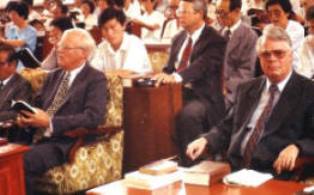 When I visited North Korea some years ago, I, along with the small team of Christians I was travelling with, were taken to one church in Pyongyang which was complete with a “pastor” and “choir,” but were not sure if it was a “fake” church as, although they were singing Christian songs, and the sermon was quite orthodox, we came to the conclusion that it was probably a “staged” service just for Western visitors.
When I visited North Korea some years ago, I, along with the small team of Christians I was travelling with, were taken to one church in Pyongyang which was complete with a “pastor” and “choir,” but were not sure if it was a “fake” church as, although they were singing Christian songs, and the sermon was quite orthodox, we came to the conclusion that it was probably a “staged” service just for Western visitors.
This echoes the findings of the South Korean government-funded Korea Institute for National Unification’s (KINU) 2015 white paper, which reported citizens were strictly barred from entering places of worship and normal citizens deemed such places predominantly as “sightseeing spots for foreigners.”
Kang, now 31, managed to escape North Korea in 2007 at the age of 20. He and his sister were caught six times before they made it to China but paid someone off each time. Fortunately for him, he had saved up money from selling electrical goods on the black market — a fast-growing phenomenon which the North Korean government are failing to control.
After a number of failed missions, Kang at long last succeeded in tracking down a broker whom he paid $10,000 so he could cross into China. Once there he found another broker who got him to Britain on an illegal passport where he claimed asylum.
He now lives in North Malden, a sleepy south-west London suburb which is home to an estimated 700 North Koreans, and is the largest North Korean community in Europe. There he works in a Korean Travel agency and is in the process of trying to get his memoir published.
North Korea has of course changed since Kang succeeded in escaping the country. NK News, an online US publication which provides news and analysis about the country, predicts some citizens are aware of the holiday, despite not being allowed to celebrate it.
It also notes Christmas is celebrated in the state-controlled churches, with the North Korean media bragging that prayer services are “held across the country” on Christmas day.
In other words, it appears that in North Korea Christmas exists for foreign visitors celebrating it in tightly controlled circumstances which are off-limits for ordinary citizens.
Photo captions: 1) Kim Jong Un, also known as “The Rocket Man.” (Daily Express illustration). 2) South Koreans watch a news broadcast of North Korean leader Kim Jong Un’s annual New Year’s Day speech, at the Seoul Railway Station in Seoul. (Lee Jin-man). 3) North Korean’s have to choose between the cross and Kim Jong Un. 4) A North Korean execution. 5) Secret believers in North Korea. 6) Dan (right) in a North Korean “church.” 7) Dan Wooding with Dr. David Cho, who organized his trip to North Korea, by the huge statue of Kim Il-sung in the capital of Pyongyang.
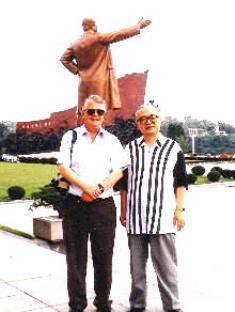 About the writer: Dan Wooding, 77, is an award-winning winning author, broadcaster and journalist who was born in Nigeria of British missionary parents, Alfred and Anne Wooding, and is now living in Southern California with his wife Norma, to whom he has been married for more than 54 years. They have two sons, Andrew and Peter, and six grandchildren who all live in the UK. Dan is the founder and international director of ASSIST (Aid to Special Saints in Strategic Times) and the ASSIST News Service (ANS), and is the author of numerous books. He also has two TV shows and a radio show, all based in Southern California. He has reported for ANS from all over the world, and is one of the very few Christian journalists allowed to report from inside of North Korea.
About the writer: Dan Wooding, 77, is an award-winning winning author, broadcaster and journalist who was born in Nigeria of British missionary parents, Alfred and Anne Wooding, and is now living in Southern California with his wife Norma, to whom he has been married for more than 54 years. They have two sons, Andrew and Peter, and six grandchildren who all live in the UK. Dan is the founder and international director of ASSIST (Aid to Special Saints in Strategic Times) and the ASSIST News Service (ANS), and is the author of numerous books. He also has two TV shows and a radio show, all based in Southern California. He has reported for ANS from all over the world, and is one of the very few Christian journalists allowed to report from inside of North Korea.
** You may republish this and any of our stories with full attribution to the ASSIST News Service (www.assistnews.net). Please feel free to also tell your friends and colleagues that they can have a complimentary subscription to our news service by going to our website and signing up there.

